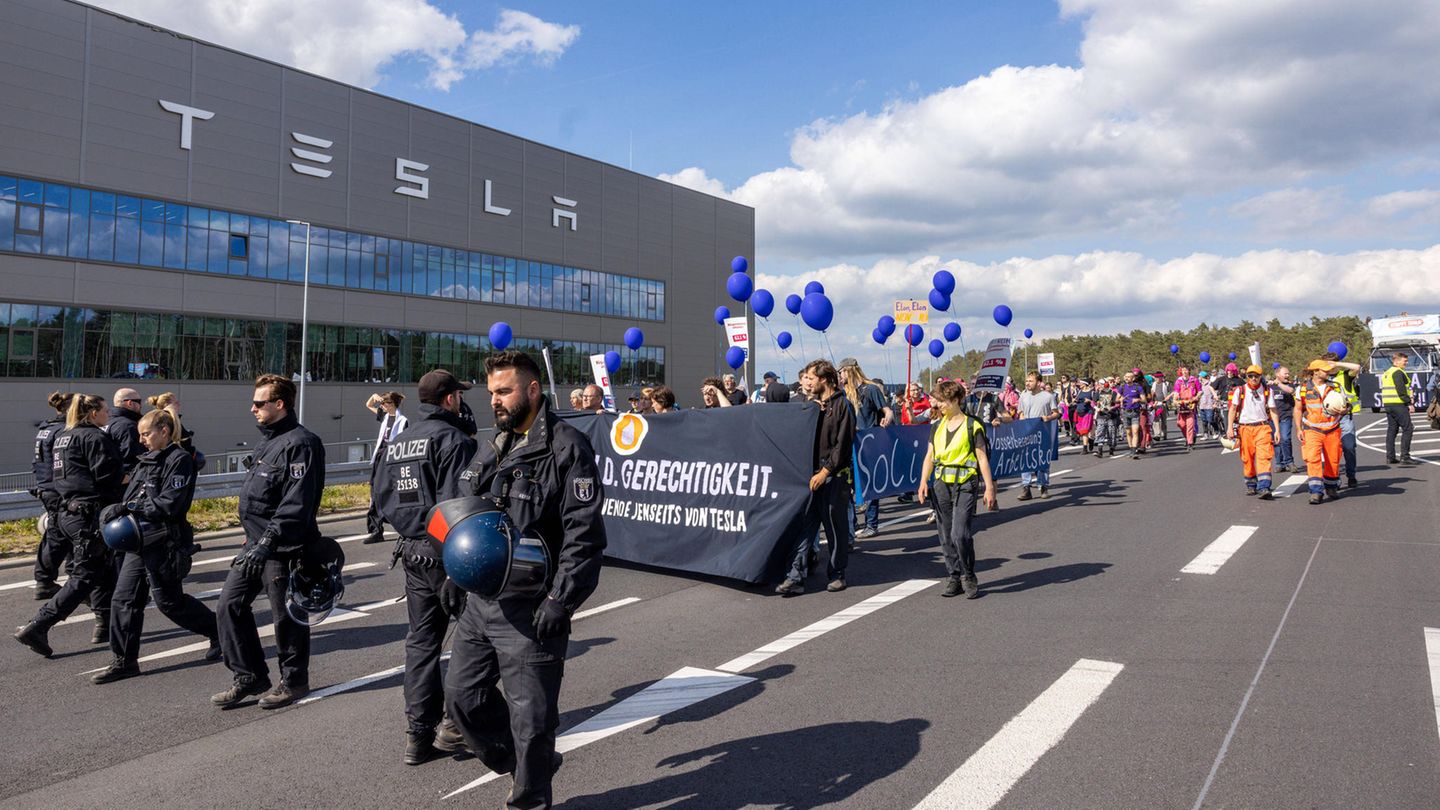The electric car market has stalled. Tesla still plans to expand its factory near Berlin – but under certain conditions.
Protests, production shutdowns, problems on the market: US electric car manufacturer Tesla is driving in Germany this year despite growing resistance. The company is sticking to its expansion plans for its only European factory in Grünheide near Berlin. But due to the difficult market situation, the timetable is completely open. “We firmly believe that the market will pick up again. It is certainly a question of how quickly and when,” said plant manager André Thierig to the German Press Agency. But he stressed: “We will not spend several billion on expanding the factory without the signals being very clear that the market is asking for this.”
The Tesla factory manager not only makes it clear that building another factory would cost several billion euros, but also states the conditions for doing so. “We can step on the gas if we notice that we need it,” said Thierig, who has worked in the automotive industry for almost 25 years. “We still produce three shifts five days a week and could start up again at any time.”
Tesla: Significantly fewer new electric cars registered
The electric car market is in a slump. In the first six months of this year, the number of new registrations in Germany in the electric sector was 184,125, including 21,249 Teslas, according to figures from the Federal Motor Transport Authority. Things looked better in the same period last year: 220,244 electric vehicles were registered then, including 36,384 Teslas.
The company, led by tech billionaire Elon Musk, closed the second quarter in a row with a decline in profits worldwide. The previously planned job cuts at Tesla also had consequences for Grünheide: “Our planning at the beginning of the year predicted significantly stronger growth, which did not materialize,” said Thierig. “We eliminated the 400 jobs quite quickly and quietly with an attractive severance package.”
He points to production for the British Isles as a positive sign. “Because we now also serve the right-hand drive market in Great Britain and Ireland from Berlin, we have a larger sales market that we can access directly.”
Application for approval for expansion in stages
Tesla has been producing electric cars in Grünheide in Brandenburg for more than two years. According to the company, almost 12,000 employees work there. The car manufacturer wants to increase production from an estimated 250,000 cars per year to one million vehicles per year in the future.
The first application for environmental approval for the expansion has been submitted to the state of Brandenburg, but is being delayed. Initially, this only concerns construction work on existing buildings – the state environmental agency has granted a provisional permit for this. “We expect the first partial permit to come in September or October,” said Thierig. The state environmental agency also gives a similar timetable. Two further applications are planned so far, including one for approval of a new factory.
The start to the year was bumpy. Production was halted for around two weeks in January and February because components were missing due to attacks by the Yemeni Houthi militia on ships in the Red Sea. Protests against the US company are growing. Since February, environmental activists have been camping in the forest near the factory to protest against an expansion that includes deforestation and a new freight station, as well as against water consumption. Following a public survey in Grünheide, the majority of which spoke out against the expansion, less forest is to be cleared.
Resistance is growing
In March, Tesla’s power supply was attacked near the factory. Car production was halted for almost a week due to a power outage. In May, environmental activists attempted to storm the Tesla site during protests. In June, production was halted again – according to Tesla, due to internal optimizations. The carmaker has introduced more automation: Previously, forklifts transported parts in the body shop, for example, but now this is fully automated.
Planning work is currently underway for a new freight station. For this, forest owned by the state will have to be cleared. “We are in talks with the forestry department about the purchase,” said Thierig. The Finance Committee of the Brandenburg State Parliament must give the green light – it is unclear whether this will happen during this legislative period. “Then we would have a chance of completing the purchase possibly this year.”
Environmentalists have concerns – Tesla rejects them
Since construction, there have been major concerns from environmentalists and residents, also because the plant is partly located in a water protection area. Last year, fresh water consumption was less than 500,000 cubic meters, which is significantly less than the agreed amount of water per year. According to Tesla, 1.8 cubic meters of water are used per car. This is well below the average for the auto industry, the company emphasizes. The German carmaker BMW says it will use 1.78 cubic meters of drinking water per vehicle produced in 2023.
Southeast Berlin
“Giga” in Grünheide: This is Tesla’s car factory in Brandenburg
Tesla does not want to use any more water for the expansion than before. The contractually guaranteed amount is enough for a million cars, “because in the future we want to recycle not only our process water, but also our sanitary wastewater in the factory,” said Thierig. He is critical of the protest: “We build electric cars here, we are not an oil refinery or whatever.” The protest camp is still in the forest near the factory, however.
Source: Stern




